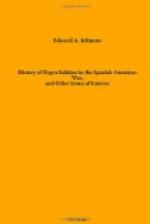NEGROES FIGHT LIKE TIGERS.
Company F, Twenty-fourth Infantry, lost Lieutenant Augustin, of Louisiana, killed, and Captain Crane was left without a commissioned officer. The magnificent courage of the Mississippi, Louisiana, Arkansas and Texas Negroes, which make up the rank and file of this regiment, is the admiration of every officer who has written here since the fight. The regiment has a large proportion of Southern-born officers, who led their men with more than usual exposure. These men had always said the Southern Negro would fight as staunchly as any white man, if he was led by those in whom he had confidence. The question has often been debated in every mess of the army. San Juan hill offered the first occasion in which this theory could be tested practically, and tested it was in a manner and with a result that makes its believers proud of the men they commanded. It has helped the morale of the four Negro regiments beyond words. The men of the Twenty-fourth Infantry, particularly, and their comrades of the Ninth and Tenth Cavalry as well, are proud of the record they made.
THEY NEVER WAVERED.
The Twenty-fourth took the brunt of the fight, and all through it, even when whole companies were left without an officer, not for a moment were these colored soldiers shaken or wavering in the face of the fierce attack made upon them. Wounded Spanish officers declare that the attack was thus directed because they did not believe the Negro would stand up against them and they believed there was the faulty place in the American line. Never were men more amazed than were the Spanish officers to see the steadiness and cool courage with which the Twenty-fourth charged front forward on its tenth company (a difficult thing to do at any time), under the hottest fire. The value of the Negro as a soldier is no longer a debatable question.
It has been proven fully in one of the sharpest fights of the past three years.
* * * * *
“OUR BOYS,” THE SOLDIERS.
“What Army Officers and Others Have to Say of the Negroes Conduct in War”—“Give Honor to Whom Honor is Due”—“Acme of Bravery.”
It has been said, “Give honor to whom honor is due,” and while it is just and right that it should be so, there are times, however, when the “honor” due is withheld. Ever since the battle of San Juan Hill at Santiago de Cuba nearly every paper in the land has had nothing but praise for the bravery shown by the “Rough Riders,” and to the extent that, not knowing the truth, one would naturally arrive at the conclusion that the “Rough Riders” were “the whole thing.” Although sometimes delayed, the truth, like murder, “will out.” It is well enough to praise the “Rough Riders” for all they did, but why not divide honors with the other fellows who made it possible for them, the “Rough Riders,” to receive praise, and be honored by a generous and valorous loving nation?




